A space 2.5cm wide between two large plane surfaces is filled with oil. Force required to drag a very thin plate of area just midway the surfaces at a speed of is 1N. The coefficient of vescosity in is:
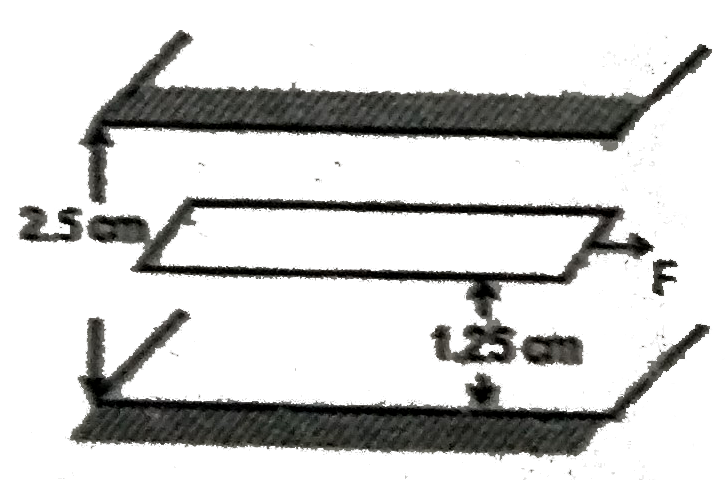
The correct Answer is:B
Velocity gradient
as force on the plate due to viscocity is from upper as well as lower portion of the oil, equal from each part,
Then
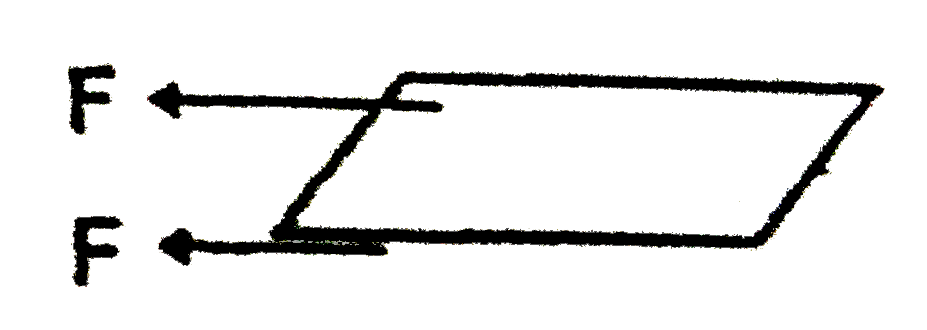
Topper's Solved these Questions
- FLUID MECHANICSBOOK - RESONANCE ENGLISHCHAPTER - FLUID MECHANICSEXERCISE - Examples
22 Videos
- FLUID MECHANICSBOOK - RESONANCE ENGLISHCHAPTER - FLUID MECHANICSEXERCISE - Board Level Exercise
18 Videos
- ELECTROSTATICSBOOK - RESONANCE ENGLISHCHAPTER - ELECTROSTATICSEXERCISE - Exercise
52 Videos
- FULL TEST 1BOOK - RESONANCE ENGLISHCHAPTER - FULL TEST 1EXERCISE - Exercise
30 Videos
Similar Questions

A space 2.5cm wide between two large plane surfaces is filled with oil. Force required to drag a very thin plate of area 0.5m2 just midway the surfaces at a speed of 0.5msec is 1N. The coefficient of viscosity in kg−sm2 is:
View SolutionThe space between two large plane surfaces is 2.5 cm and it is filled with glycerine.
What force is required to drag a very thin plate 1m2 in area, between the surfaces at a speed of 1m/s ? (The plate is at a distance of 1 cm from one of the surfaces. ) (η=0.75Ns/m2)
View SolutionFind the force required to pull a block of mass 100kg up an incline of 8∘ at a uniform speed of 5m/s. The coefficient of friction between the block and the plane is 0.3.
View SolutionGlycerine is filled in 25 mm wide space between two large plane horizontal surfaces. A thin plate of area 0.75m2 at a distance of 10 mm from one of the surfaces is in a horizontal position be the plates inside the glycerine. It is dragged horizontally at a constant speed of 0.5ms2. Take coefficient of viscosity η= 0.5 Ns m−2. What is the force required to drag the plate at a constant speed (in newton) ?
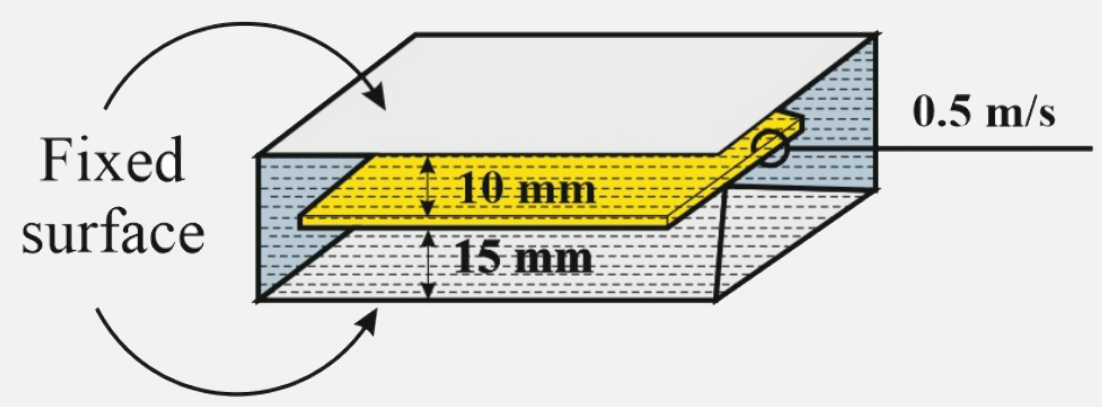
View SolutionFind the minimum force required to drag a hard polythene plate of area 2m2 on a thin film of oil of thickness 0.25cm and η=15 poise. Assume the speed of the plate is 10cms−1.
View SolutionA layer of glycerine of thickness 1 mm is present between a large surface and small surface of area 0.1m2. With what force the small surface is to be pulled, so that it can move with a velocity of 1 m/s ?
(coefficient of viscosity=0.07g−m−1s−1)
View Solution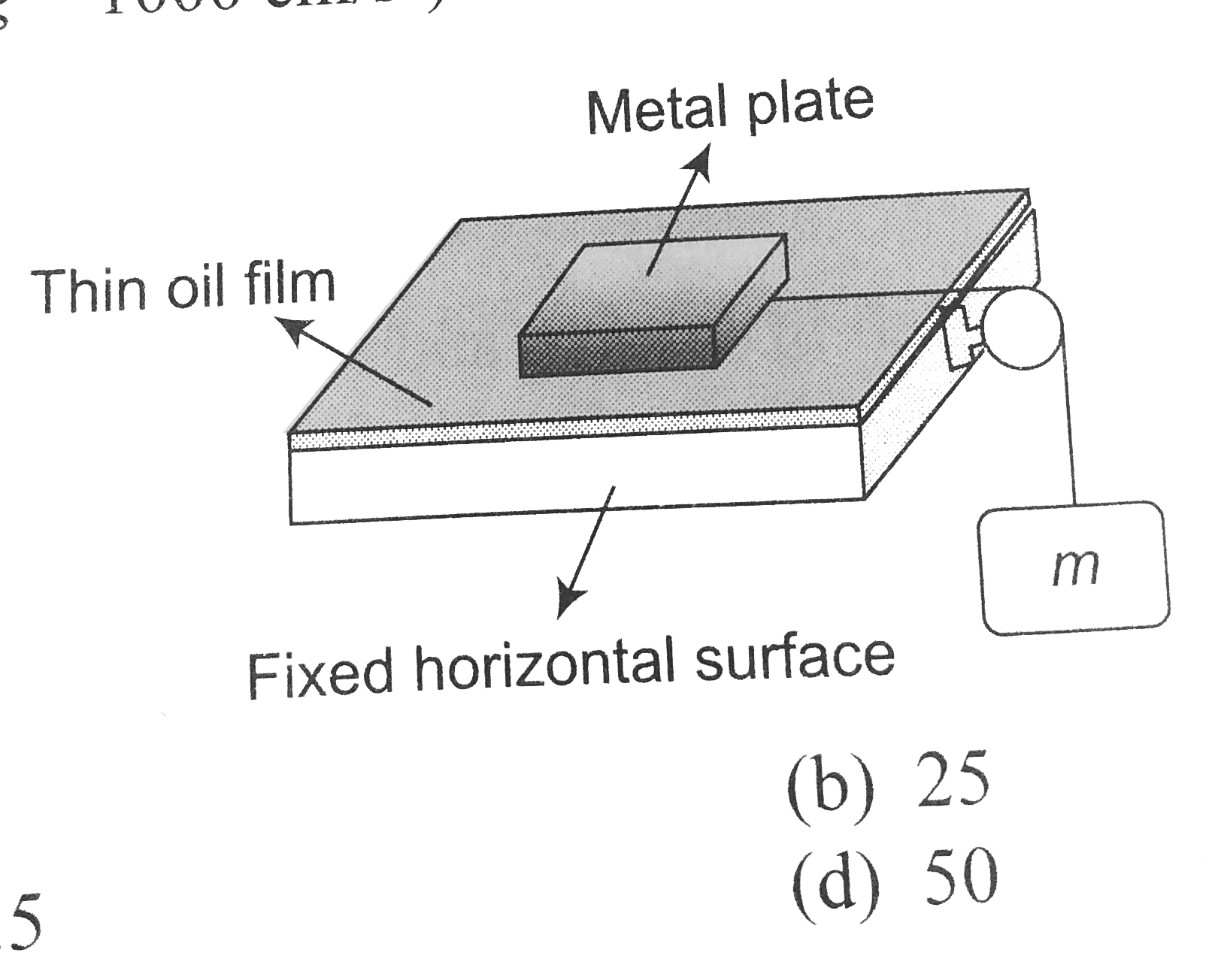
A rectangular metal plate has dimensions of 10cm×20cm. A thin film of oil separates the plate from a fixed horizontal surface. The separation between the rectangular plate and the horizontal surface is 0.2mm. An ideal string is attached to the plate and passes over an ideal pulley to a mass m. When m=125gm, the metal plate moves at constant speed of 5cms, across the horizontal surface. Then the coefficient of viscosity of oil in dyne−scm2 is (Use g=1000cms2)
View SolutionCalculate the Force (F) required to cause the block of mass m1=20kg just to slide under the block of mass m2=10kg [ coefficient of friction μ=0⋅25 for all surfaces ]
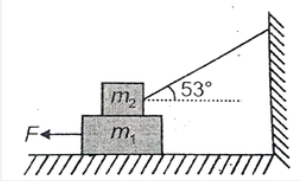
View SolutionCalculate the force required to separate the glass plates of area 10−2m2 with a film of water 0.05 mm thickness between them (surface tension of water =70×10−3N/m))
View SolutionThe surface tension of liquid is 0.5 N / m . If a film is held on a ring of area 0.02 m square , its surface energy is
View Solution
